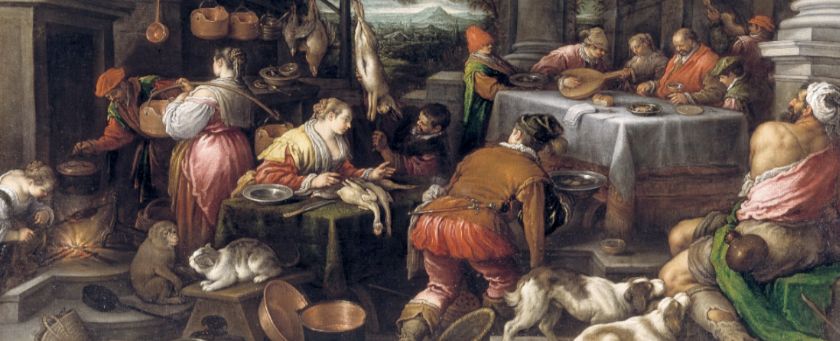Jesus Shines A Light On Social Disparity
Twenty-sixth Sunday in Ordinary Time, Year C

Readings:
Am. 6:1a, 4-7; Ps. 146; 1 Tm. 6:11-16; Lk. 16:19-31
(Audio recorded live, 25 September 2022)
“If they will not listen to Moses and the prophets, neither will they be persuaded if someone should rise from the dead.” This goes to show the hardness of heart of those men in seats of honor and power in Jesus’ day. The story of the rich man and Lazarus is a glimpse into the utter disparity between social classes, as well as the history of the people of Israel. That the poor man, Lazarus, has a name in this story, while the rich man does not, shows how much the Lord values the dignity of the poor over the rich.
A theme that runs throughout the Gospel is whether or not people come to know the Lord. In Matthew’s Gospel, Jesus says, “Not everyone who says to me, ‘Lord, Lord,’ will enter the kingdom of heaven…” (Matt. 7:22). We see this play out in today’s parable as the rich man finds himself in the netherworld being tormented while Lazarus is comforted by Abraham in heaven. How is it that Lazarus came to be comforted? It’s really quite simple. We might consider something we have all done at one time or another: When we were down and out, when we were in need, when we had nowhere else to go, we got down on our knees and we prayed to God. That act of humility is not unlike what Lazarus was doing at the gate of the rich man’s home. He longed to eat even the scraps that fell from the rich man’s table. This longing is like our prayer to God, whenever we are in need. It is the only way to say, “Lord, Lord.” Surely those who go to God in this way will be comforted.
But, what of the brothers of the rich man? It is interesting that Jesus mentions five brothers. One of the most prominent men at the time of Jesus was the high priest Caiaphas. It turns out that Caiaphas had five brothers, so there is an interesting correlation between the characters in the story and the leadership of Jesus’ day. It is also worth mentioning that as a Sadducee, Caiaphas did not believe in the resurrection, hence the last line of the Gospel passage: “If they will not listen to Moses and the prophets, neither will they be persuaded if someone should rise from the dead.” In other words, certain ideologies will prevent people from being converted by Jesus. The pivotal act for all Christians is the Paschal Mystery, and the climax of this mystery is the Resurrection of Jesus. As St. Paul says, “If there is no resurrection of the dead, then neither has Christ been raised” (1 Cor. 15:13).
If Caiaphas and his brothers did not believe in the resurrection of the body, what then of their adherence to Moses and the prophets? The rich man’s concern for the well being of his brothers is laudable, but why might he want to get them a message from the netherworld? Might it be because after death the veil is lifted and all treachery and deceit is revealed? Perhaps he wanted to warn his brothers so as to prevent them from having the same punishment. Yet, Abraham says if they do not listen to Moses and the prophets, neither will they listen even if someone should rise from the dead. Clearly, then, these men also were not following the teachings of Moses and the prophets, and they too shall suffer the same fate as the rich man. For Moses and the prophets all taught that we are to Love God with our whole heart, our whole soul, and our whole strength, and to love our neighbor as ourself. For their failure to carry out the Law of Love, they, like the complacent in Zion shall be the first to go into exile, as prophesied by Amos. “They drink wine from bowls and anoint themselves with the best oils,” yet they will not lift a finger to care for the poor. As the psalmist says, “[T]he Lord raises up those who were bowed down. The Lord loves the just; the Lord protects strangers….The fatherless and the widow he sustains, but the way of the wicked he thwarts.”
In light of the dreadful fate of those who choose wickedness over love, how might we respond to God’s Word today? St. Paul gives us a good blueprint for holiness. He says, “But you, man of God, pursue righteousness, devotion, faith, love, patience, and gentleness. Compete well for the faith.” In other words, try to outdo one another in these virtues. It is so easy for us to compete over looks, strength, speed, agility, wits, possessions, but these are on the surface. When was the last time we tried to outdo someone in faith, devotion, righteousness, love, patience, or gentleness. Could we respond to this teaching by trying to outdo others in good virtues this week? May the communion we share today, then, increase in us these qualities so that by God’s grace we may keep the commandment of love without stain or reproach as we await the blessed appearance of our Lord Jesus Christ.





Share this post
Twitter
Facebook
Pinterest
Email